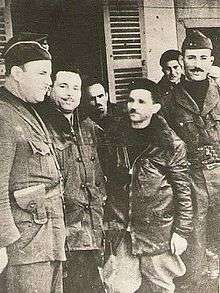Saïd Mohammedi
Col. Saïd Mohammedi (December 27, 1912 in Larbaâ Nath Irathen – December 6, 1994 in Algiers), or Si Nacer, was an Algerian nationalist and politician.
Saïd Mohammedi (محمدي السعيد) | |
|---|---|
 Saïd Mohammedi (on the left) with other FLN militants | |
| Born | December 27, 1912 |
| Died | December 6, 1994 (aged 81) |
| Nationality | Algerian |
| Organization | FLN |
| Known for | Politician |
Early life and collaborationism
Born in the Berber Kabyle region of Tizi Ouzou, Saïd Mohammadi served in the French army. Attracted to Algerian nationalism, and intensely religious, he became involved with the Mufti of Jerusalem, Hajj Amin al-Husseini. During World War II, he joined the Mufti to work with Nazi Germany, hoping that Hitler's defeat of France would lead to the liberation of Algeria and other French colonies. He enlisted in the Wehrmacht and fought in the Balkans (Yugoslavia and Greece) as well as on the Russian front during Operation Barbarossa. After a stay in Berlin, he received the Iron Cross First Class, and was an exemplary soldier.
In the summer of 1944, along with five others (Algerians and Germans), he was sent by the Abwehr on intelligence and sabotage missions to Algeria, but was arrested in the region of Tebessa and sentenced to life in prison.
FLN career
He was released in 1952, and two years later, he joined the Front de libération nationale (FLN), which begun an armed revolt against France in November 1954. Unlike most of the FLN leadership, he had no previous involvement with the Algerian nationalist groups, such as the Parti du Peuple Algérien (PPA) of Messali Hadj or the UDMA of Ferhat Abbas, or even with the religious Ulama movement of shaykh Ben Badis. In 1956, Saïd Mohammedi was made colonel of the Armée de Libération Nationale (ALN) and became head of Wilaya III, an important FLN combat region comprising his native Kabylie. His nom de guerre was Si Nacer, and he famously insisted on wearing an old German military helmet as his personal trademark.
Closely allied to Krim Belkacem, he was in 1958 designated chief of staff for the ALN. However, he proved unable to assume control on the field, facing resistance from, among others, ALN strongman col. Houari Boumédiène. He lost his military positions in 1960, as Krim's fortunes declined, and had to make do with mainly symbolic posts in the GPRA government-in-exile.
Post-independence career
After independence, an army-based coalition composed of Ahmed Ben Bella, Mohamed Khider, Boumédiène and others attempted to seize power, as did a rival GPRA-centered group headed by Krim Belkacem, Benyoucef Benkhedda, and others. Mohammedi initially stood with Krim's group, but then switched sides and was rewarded with a post as the second Vice President of Algeria after Ben Bella had been installed as president of Algeria in a one-party system.[1] In 1965, Boumédiène overthrew Ben Bella. Mohammedi acquiesced, and was carried on into the Revolutionary Command Council set up by Boumédiène in place of the government and parliament, but soon thereafter, he was outmanoeuvred by Boumédiène and his Oujda group and lost his posts.
In 1991, Mohammedi stood as electoral candidate for the Front Islamique du Salut (FIS), an anti-FLN Islamist group, in Algiers, but as elections were cancelled by a military coup in 1992, the FIS was banned. He died two years later.
References
- Ottaway, Professor Marina; Ottaway, David; Ottaway, Marina (December 15, 1970). "Algeria: The Politics of a Socialist Revolution". University of California Press – via Google Books.
- Achour Cheurfi, La classe politique algérienne, de 1900 à nos jours. Dictionnaire biographique (Casbah Editions, 2nd edition, Algiers 2006)
- Jacques Duchemin, Histoire du F. L. N. (Editions Mimouni, Algiers 2006)
| Wikimedia Commons has media related to Saïd Mohammedi. |